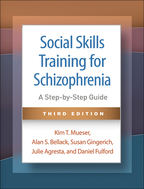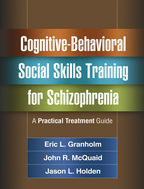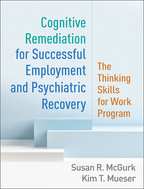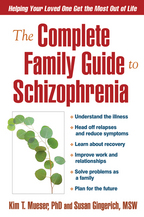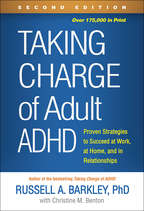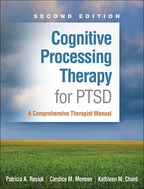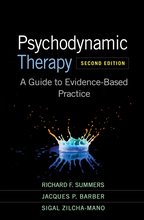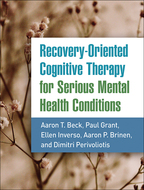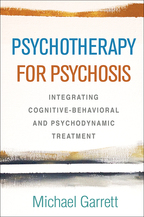Social Skills Training for Schizophrenia
Third Edition
A Step-by-Step Guide
Kim T. Mueser, Alan S. Bellack, Susan Gingerich, Julie Agresta, and Daniel Fulford
Foreword by Patrick D. McGorry
HardcoverPaperbacke-bookprint + e-book
Hardcover
orderOctober 1, 2024
ISBN 9781462555048
Price: $108.00 424 Pages
Size: 8" x 10.5"
Paperback
orderSeptember 2, 2024
ISBN 9781462555031
Price: $72.00424 Pages
Size: 8" x 10.5"
e-book
orderAugust 14, 2024
PDF and Accessible ePub ?
Price: $72.00 424 Pages
ePub is Global Certified Accessible
print + e-book $144.00 $86.40
orderPaperback + e-Book (PDF and Accessible ePub) ?
Price: 424 Pages
ePub is Global Certified Accessible
“This book should be required reading for all those involved in the comprehensive treatment and rehabilitation of individuals with schizophrenia. We recommend it highly.”

—Journal of Clinical Psychiatry (on the second edition)
“Any clinician, regardless of experience level, who is interested in providing social skills training to individuals with schizophrenia—or to their families—will find a wealth of practical, clinically and empirically sound information.”

—Bulletin of the Menninger Clinic (on the second edition)
“The authors provide all the necessary ingredients for implementing state-of-the-art social skills training as they focus on assessment, group leadership skills, and carrying out the group tasks with specific and well-designed curricula....This guide also serves as a textbook for students, enabling them to make giant leaps in their understanding of the nature and execution of evidence-based practices for individuals with persistent mental illness, making clinical experiences more rewarding for trainees and more precise for their supervisors. This instruction manual has the makings to become a classic reference book on the topic of social skills training.”

—Community Mental Health Journal (on the second edition)
“This book can and will change lives. Social skills are a critical aspect of quality of life for all people, and for those with serious mental illness, in particular. This book gives clinicians and administrators a structured, recovery-oriented framework for implementing groups to promote and teach critical social skills. The third edition includes discussions of SST in important areas, such as in first-episode psychosis, technology-based communication, and in different cultural contexts. This is a practical, step-by-step book that makes SST accessible and transparent.”

—Ken Duckworth, MD, Chief Medical Officer, National Alliance on Mental Illness
“This dynamic, contemporary third edition brings together authors at the forefront of research and clinical services for people with schizophrenia. It includes cutting-edge research evidence for SST, including findings from meta-analysis and other rigorous evaluation strategies. The book translates complex medical and psychiatric information into simple, approachable language for professionals and students at any level. It is firmly anchored in evidence-based practices, but also has a foundational orientation toward mental health recovery. The authors demonstrate tools and interventions that support long-term gains in wellness and community living for individuals with serious mental illness.”

—Lisa A. Razzano, PhD, Department of Psychiatry, University of Illinois at Chicago
“Improving the social skills of people with schizophrenia has tremendous implications for long-term prognosis. Previous editions of this book have been my 'go to' for teaching social skills in my own clinical work and for recommendation to students and colleagues. The third edition extends the principles of SST to a variety of new populations, such as individuals with first-episode psychosis; has important coverage of technology-based communication; and addresses ways to adapt SST depending on clients’ race, gender, and sexual identity, in order to make these skills more accessible to all. This book remains the resource on SST.”

—David Lewis Penn, PhD, Department of Psychiatry, University of North Carolina at Chapel Hill
“This book is robust in its presentation of foundational theory and research, yet practical enough to help the busy clinician get started implementing SST immediately. Assessment tools and therapy worksheets are provided, along with plentiful examples. The book's modular approach and attention to specific populations allow practitioners to customize groups for the unique needs of service users and contexts. Experienced practitioners and students alike will find essential, evidence-based tools to support the recovery of individuals with schizophrenia.”

—Shaun M. Eack, PhD, Professor and Endowed Chair in Social Work, School of Social Work and Department of Psychiatry, University of Pittsburgh
“This work has long been a crucial resource for implementing SST. New material in the third edition makes it essential reading—even for clinicians familiar with the previous edition. The authors translate decades of research on psychopathology and SST into practical recommendations.”

—Stephen R. Marder, MD, Distinguished Professor of Psychiatry, Semel Institute for Neuroscience and Human Behavior, University of California, Los Angeles
—Journal of Clinical Psychiatry (on the second edition)
“Any clinician, regardless of experience level, who is interested in providing social skills training to individuals with schizophrenia—or to their families—will find a wealth of practical, clinically and empirically sound information.”
—Bulletin of the Menninger Clinic (on the second edition)
“The authors provide all the necessary ingredients for implementing state-of-the-art social skills training as they focus on assessment, group leadership skills, and carrying out the group tasks with specific and well-designed curricula....This guide also serves as a textbook for students, enabling them to make giant leaps in their understanding of the nature and execution of evidence-based practices for individuals with persistent mental illness, making clinical experiences more rewarding for trainees and more precise for their supervisors. This instruction manual has the makings to become a classic reference book on the topic of social skills training.”
—Community Mental Health Journal (on the second edition)
“This book can and will change lives. Social skills are a critical aspect of quality of life for all people, and for those with serious mental illness, in particular. This book gives clinicians and administrators a structured, recovery-oriented framework for implementing groups to promote and teach critical social skills. The third edition includes discussions of SST in important areas, such as in first-episode psychosis, technology-based communication, and in different cultural contexts. This is a practical, step-by-step book that makes SST accessible and transparent.”
—Ken Duckworth, MD, Chief Medical Officer, National Alliance on Mental Illness
“This dynamic, contemporary third edition brings together authors at the forefront of research and clinical services for people with schizophrenia. It includes cutting-edge research evidence for SST, including findings from meta-analysis and other rigorous evaluation strategies. The book translates complex medical and psychiatric information into simple, approachable language for professionals and students at any level. It is firmly anchored in evidence-based practices, but also has a foundational orientation toward mental health recovery. The authors demonstrate tools and interventions that support long-term gains in wellness and community living for individuals with serious mental illness.”
—Lisa A. Razzano, PhD, Department of Psychiatry, University of Illinois at Chicago
“Improving the social skills of people with schizophrenia has tremendous implications for long-term prognosis. Previous editions of this book have been my 'go to' for teaching social skills in my own clinical work and for recommendation to students and colleagues. The third edition extends the principles of SST to a variety of new populations, such as individuals with first-episode psychosis; has important coverage of technology-based communication; and addresses ways to adapt SST depending on clients’ race, gender, and sexual identity, in order to make these skills more accessible to all. This book remains the resource on SST.”
—David Lewis Penn, PhD, Department of Psychiatry, University of North Carolina at Chapel Hill
“This book is robust in its presentation of foundational theory and research, yet practical enough to help the busy clinician get started implementing SST immediately. Assessment tools and therapy worksheets are provided, along with plentiful examples. The book's modular approach and attention to specific populations allow practitioners to customize groups for the unique needs of service users and contexts. Experienced practitioners and students alike will find essential, evidence-based tools to support the recovery of individuals with schizophrenia.”
—Shaun M. Eack, PhD, Professor and Endowed Chair in Social Work, School of Social Work and Department of Psychiatry, University of Pittsburgh
“This work has long been a crucial resource for implementing SST. New material in the third edition makes it essential reading—even for clinicians familiar with the previous edition. The authors translate decades of research on psychopathology and SST into practical recommendations.”
—Stephen R. Marder, MD, Distinguished Professor of Psychiatry, Semel Institute for Neuroscience and Human Behavior, University of California, Los Angeles

